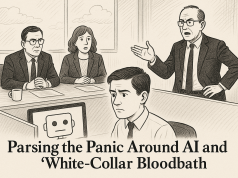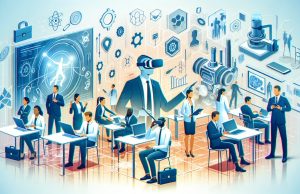As the first lights of dawn cast their glow on the bustling streets of New York, the city that never sleeps is already in motion. But something is different in this post-pandemic era. The towering office buildings, once teeming with activity, now face a new reality: silence in their halls, with many workers contributing from afar. Welcome to the future of work, a landscape profoundly transformed, where remote and hybrid models have taken precedence, changing not just how we work, but who we are at work.
The shift was abrupt but perhaps inevitable; a response to a global crisis that has now become a blueprint for a new mode of operation. As an experienced Organizational Psychologist, I have observed firsthand the tectonic shifts in the psychology of the workplace. In this blog, we will explore the multifaceted implications of this pivotal transition.
**Mental Health in the Digital Workspace**
The mental well-being of employees has taken center stage. Remote work, while offering flexibility, blurs the lines between personal and professional life, leading to an ‘always-on’ culture that can fuel stress and burnout. It’s imperative for organizations to recognize these challenges and proactively address them with support systems and policies that promote work-life balance.
**Team Cohesion in Virtual Realms**
How do teams thrive when physical proximity is no longer a given? The crux lies in the art of virtual leadership – directing, motivating, and connecting with individuals across screens. Companies that cultivate a robust digital culture and invest in technology that facilitates collaboration will navigate these waters successfully. But beyond tools and tactics, the human touch remains paramount; empathy and clarity have never been more valuable.
**The Evolution of Organizational Culture**
Culture is the lifeblood of any organization, and it’s undergoing a metamorphosis. As remote work eliminates casual watercooler interactions and shared coffee breaks, companies must reimagine how to instill a sense of purpose and shared values. The challenge is to create a culture that transcends physical boundaries – a digital ethos that embodies the organization’s vision and engages every employee, regardless of location.
**Adaptable Leadership and Development**
Leaders are the navigators in this journey toward a dispersed workforce. They must pivot their management styles to lead by influence rather than authority, to listen more than they speak, and to inspire rather than instruct. Development programs, too, must evolve, focusing not just on skills but on nurturing resilience, adaptability, and emotional intelligence.
**Fostering Belonging and Engagement Remotely**
Finally, the question of connection: how to foster a sense of belonging when isolation is an occupational hazard? The answer lies in intentional engagement – virtual team-building activities, regular check-ins, and recognition of accomplishments. It’s about creating a virtual workspace where every employee feels seen, heard, and valued.
As we embark on this exploration, I invite you to share your insights and experiences. The story of work is being rewritten, and together, we will discover the narrative of this new chapter. Join us at The Work Times, where we chronicle the evolution of work, worker, and workplace in a world that’s constantly in flux.




























